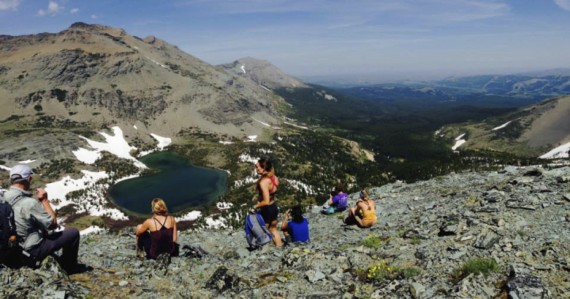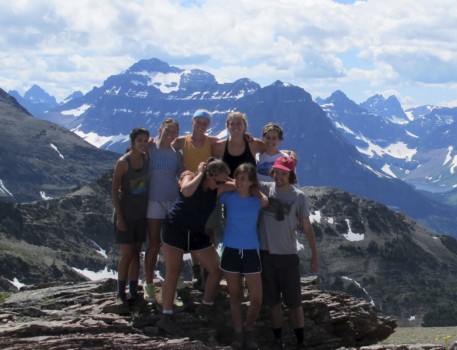During the summer of 2014, Alumni Memorial Scholar (AMS) James Paris ’15 used his AMS Grant funds to visit Montana with a field-based ecology program. In what follows, James describes his research experience and the value of the AMS Grant.
This past summer, I attended the summer academic program at the Flathead Lake Biological Station located on Flathead Lake, Montana. I completed a four-week course in field ecology that delved into general theory, field experimentation and data collection, and local ecological phenomena. The course concerned the natural environment, so we spent a lot of time hiking the surrounding areas and made frequent trips to Glacier National Park.

The class at Firebrand Pass on eastern side of Glacier National Park watching a moose wade in the lake and big horn sheep traverse the mountainside.
The beginning of the course was spent learning about local plants and how they are distributed across the landscape. We also contributed data to a century-long project on small mammal population size around the biological station. In the second week, we measured lodgepole pine regrowth to better understand how forests recover from a wildfire. Throughout, we traveled to nearby habitats to observe the unique interactions between animals, plants, and the physical environment. Some noteworthy places were the prairie pothole system, a collection of small ponds left behind by retreating glaciers; a river floodplain environment, which illustrated how ecosystems are composed of shifting patched of habitats; and the alpine zone, located above the tree line at high elevations. For my final project, I examined the animal community in an aquifer that flows into Flathead Lake. I found this environment to be particularly unique, because it was predicted to have a uniform physical arrangement. Yet, I found a very diverse community within it, including insect species normally found in fast-moving waters.
Overall, this class contributed to my understanding of the distribution and abundance of organisms in relation to their environment and how tenets of ecological theory play out in the Flathead Lake and Glacier Park Ecosystems. But just as significantly, I learned how to observe the natural world in ways that will allow me to ask important questions and gather relevant information, which I think is crucial for all fields of science. This class also honed my career interests. Though I already knew I wanted to pursue research within ecology, I am now keenly interested in mountain rivers and streams, as well as their associated groundwater environments.

Posing for a picture at Scenic Point near Two Medicine in Glacier Park.
Being able to use an AMS Grant for this experience was amazing. Because I did not claim credit for the course, I worried less about my grade and, instead, could learn for the sake of learning. As a result, it was more liberating than a normal course, and I felt I was gaining knowledge for future career opportunities, my own thesis research back at Colgate, and my burgeoning personal interest in ecology.


